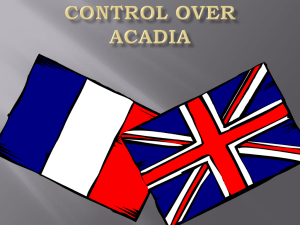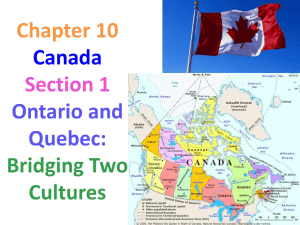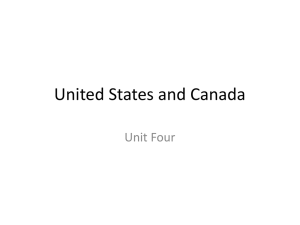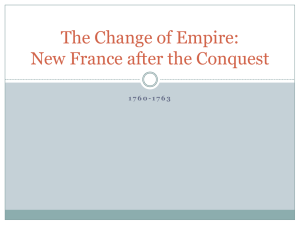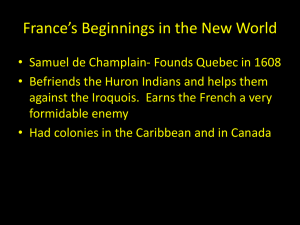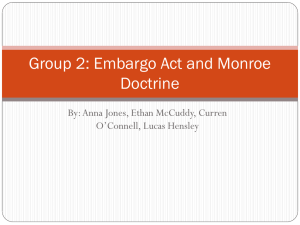File
advertisement
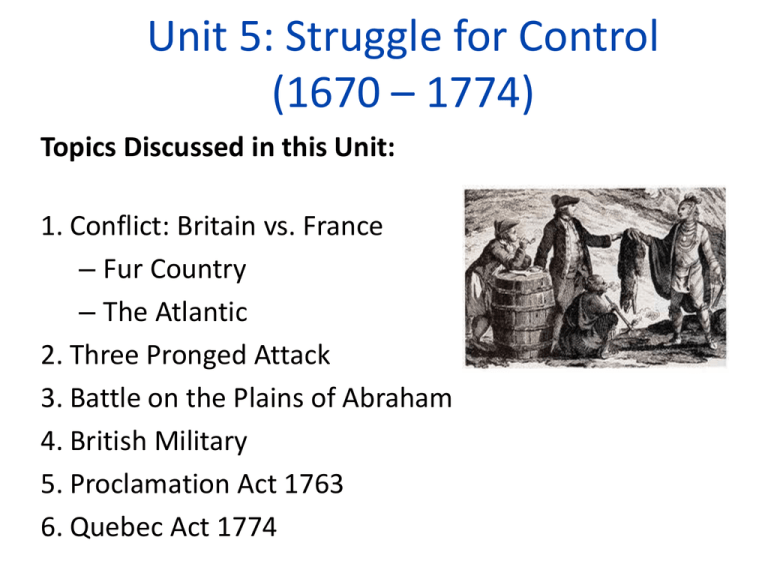
Unit 5: Struggle for Control (1670 – 1774) Topics Discussed in this Unit: 1. Conflict: Britain vs. France – Fur Country – The Atlantic 2. Three Pronged Attack 3. Battle on the Plains of Abraham 4. British Military 5. Proclamation Act 1763 6. Quebec Act 1774 Overview Activity • • • • Turn to Pg. 58 and 59 Look at the Pictures Read as a class Discuss Britain vs. France • Turn to Pg. 61 • Read the first two paragraphs • Complete first page of Worksheet 1 as a class Fur Trade: French vs. British – Pg. 62/3 • Britain & HBC 1670 – Interested in business first – Set up forts around the Bay and waited for Native people to come – Cheap and easy • France – Travelled deep into the interior – Expensive and time consuming – Developed great relationships Aboriginal Fur trade, Saskatchewan • France colonized to fund the fur trade; Britain did not at first July 1690 Frontenac Expands – Pg. 62/3 • Governor Frontenac expands the French fur trade into the Ohio and Mississippi Valley • By the 1730s, France expanded and established trading forts closer to the Native people • Allowed them to cut-off British fur traders French take Military Action – Pg. 62/3 • Between 1679 – 1713 the French attack the British to gain control of Rupert’s Land • Both countries are unable to take full control • Treaty of Utrecht 1713 – Rupert’s Land to Britain The French with their native allies attack the British in Rupert’s Land. March 1711 The Battle for the Atlantic The Battle for the Atlantic • Acadia and Newfoundland were very good fishing areas • Strategic location: control access of the St. Lawrence River and Quebec • After the Treaty of Utrecht 1713, Britain was given Acadia and Newfoundland The Battle for the Atlantic – Louisbourg • To fix problems of the Treaty of Utrecht • Looked to Ille Royale (Cape Breton Island) for fishing and military strength • Began to construct Louisbourg: a military fort considered indestructible The Battle for the Atlantic – Louisbourg • 1745 – Britain successful in taking it because it was surrounded by hills, allowing them to attack from above • Forced to return in 1748 (treaty in Europe) • Now the French, and British knew the fort could be taken Important Locations and Treaties Important Locations: Important Treaties: Newfoundland-was an important fishing area given to the British in 1713 Ils Royale-New French fishing area after 1713 and the location of Louisbourg Louisbourg-French military fortress Acadia-French farming colony in the Atlantic that was given to the British in 1713 Halifax-British military fort created to protect the people of the 13 colonies Treaty of Utrecht: signed in 1713-gave British the rights to Rupert’s Land, Newfoundland, and Acadia Treaty of Aix-la-Chapelle: signed in 1748, gave Louisbourg back to the French Treaty of Paris: signed in 1763, gave all French territory in North America to the British. (except for the two small islands of St. Pierre and Maquelon) Acadians Refuse the Oath of Allegiance • 1713: Britain took control of Acadia • Britain gave the French people of Acadia a choice to sign an Oath of Allegiance or face deportation • An Oath meant they had to support the British in future wars against the French Leader refusing to sign the • They wished to remain neutral Acadian oath of allegiance. 1754 What should the British do? • 1750s, another war coming • Governor Lawrence – Too dangerous to leave Acadia, while the British fought against the French – 1754: Gave them one more year to decide • 1755 – Acadians refuse – Governor issues deportation order Governor Lawrence informing the Acadians of their deportation, 1754 Acadians Deported, 1755 • Most sent back to France, some escaped to Louisiana and Cape Breton Island • The British Army – Burned homes – Took homes – Killed Acadians • 11 000 Acadians deported • Britain now free to sail up the St. Lawrence River British ships take the rest of the Acadians into exile, 1758 Three-Pronged Attack – Pg. 70 Three-Pronged Attack – Pg.70 • In 1756, the Seven Years War started in Europe – As with earlier wars, this effected the French and British colonization in North America • Britain wanted to win quickly in NA They brought 8 times more than the French • The French thought the war in Europe was more important • Britain begins its attack! 1. 2. 3. Louisbourg Ohio Valley Quebec 1. Capture of Louisbourg – Pg.70 • Britain attacked Louisbourg in 1758 • Goals – Weaken the French military – Take control of the St. Lawrence River – Freely sail up the river to attack Quebec • Gained the high ground • Took control in less than 60 days Louisbourg almost completely destroyed 1758 2. Capturing the Ohio Valley – Pg.70 • Britain wanted to deal with the large number of French in the Ohio Valley before taking Quebec • Worried about having French traders at their backs • Once Louisbourg was taken, it was easy to push the French out 3. Capture of Quebec– Pg.71 • Quebec was the centre of French power in NA • 1759 - General James Wolfe led the British army up the St. Lawrence River and attacked • Unsuccessful for 3 months • Wolfe decided to attack from upriver (better location) to cut off Quebec’s supplies Battle on the Plains of Abraham - 72 Wolfe Landing at the Plains of Abraham, September, 1759 • Wolfe hoped to split the French army and force them to fight in the open plains • Sailed up the St. Lawrence River near the Plains of Abraham Battle on the Plains of Abraham - 72 • Britain’s success for 2 reasons: 1. French not used to fighting in the open fields; more comfortable fighting in the forests 2. French army was split • French General, Marquis de Montcalm sent his troops to two different locations • Sept. 1759 – Quebec falls • 1760 – Montreal surrenders • 1763 Treaty of Paris signed – Hands over most of the French territory in NA to Britain Fighting on the Plains of Abraham September, 1759 British Military Rule 1760 – 63 – Pg. 78/9 • Quebec ruled by a military government (1760 – 1763) • British King was still busy fighting in Europe • No big changes, but time of great uncertainty for the French people remaining in Quebec (Canadiens) – Will they be deported like the Acadians? – New France lost its main political, business, and religious leaders who returned to France – Much of French daily life maintained Treaty of Paris 1763 • France gives up all of its possessions in New France and Acadia • France keeps two small islands: – St. Pierre – Miquelon • Ended French influence in North America • Led to the Royal Proclamation of 1763 Options Opened to the British After the Treaty of Paris, the British have to deal with a large population of the French in Quebec. What do you think they should they do ? Options Opened to the British 1. Deportation – Force the French to leave Quebec 2. Maintain the Status Quo – Allow French to keep their way of life 3. Isolation – Give the French people a new area of land Options Opened to the British 4. Assimilation – Force the French to become British 5. Biculturalism – Have a colony where both French and British cultures exist Proclamation Act 1763 – Pg. 82 Aims: • Assimilation: make Quebec British – Laws, customs, language, religion • Attract British settlers • Limit the size of Quebec – Cut the Montreal fur traders out of the Western market – Reassure the Native people that their Ohio Valley territory would be protected Proclamation Act 1763 – Pg. 82 Why? • Wanted to keep the British people in Quebec loyal • Realized the Natives were unhappy because many people from the Thirteen Colonies were moving into their land Key Items • Settlement in the Ohio and Mississippi valley forbidden • French language and Roman Catholicism allowed The Quebec Act 1774 – Pg. 84 Aim: • Biculturalism: allow French and British ways of life • Wanted to gain the loyalty of the Canadiens (Frenchspeaking Canadians) Language: • French language allowed Religion: • Roman Catholic Church allowed to continue and collect taxes Boundaries enlarged to include the fur trading areas of Ohio and Mississippi The Quebec Act 1774 – Pg. 84 Government: • Quebec ruled by an appointed British governor and an appointed council • Roman Catholics allowed in government positions • French civil law • English criminal law Land Holding System: • Seigneurial system remains – similar to the British freehold system Boundaries enlarged to include the fur trading areas of Ohio and Mississippi


